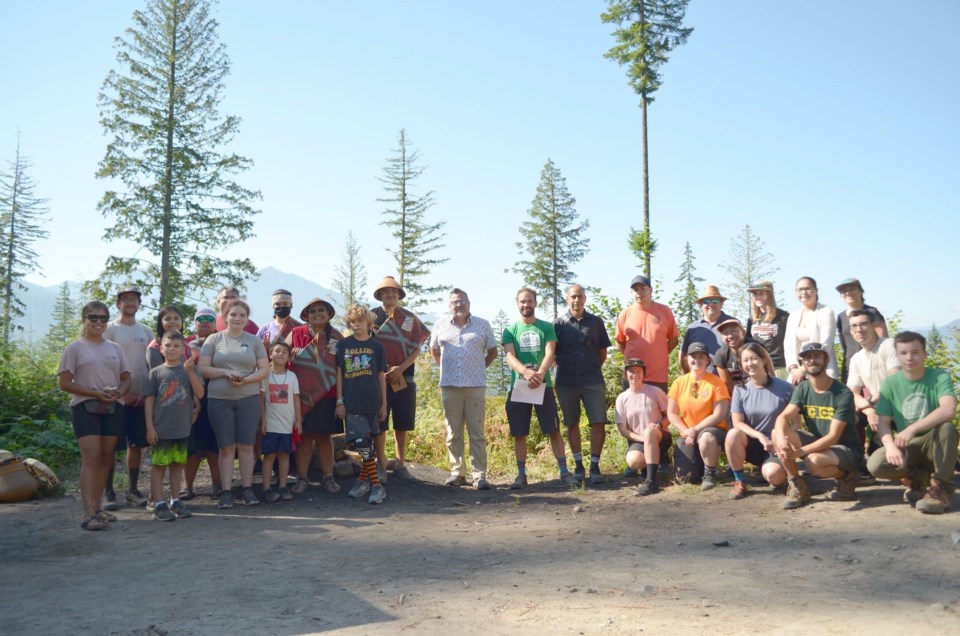In a first-of-its-kind arrangement, the Sḵwx̱wú7mesh Úxwumixw (Squamish Nation) has signed a memorandum of understanding with the Squamish Off-Road Cycling Association (SORCA) that will serve as a guidepost for future recreational land use.
On Aug. 22, at the Diamond Head riding area above Quest University, officials from SORCA and the Nation inked the agreement, signifying a new chapter in relations between the two parties.
"We are no longer invisible on our shared territory. The MOU is an opportunity to celebrate the Xay Temixw (Sacred Land) and shares the responsibility of stewardship. Recognizing the inherent value of our Territory is a humbling indication of change happening within our local communities and is a step towards protecting our land for the benefit of our future generations," said Squamish Nation spokesperson, Swixwtwn Wilson Williams in a news release.
The Nation’s Rights and Title Department director said that the agreement provides a roadmap for the future.
“It creates a pathway for us to work together, in value alignment, to continue to have people enjoy the mountain biking in our backcountry, while, at the same time, making sure we’re protecting our culturally-sensitive areas, but also working together to provide health and well-being for our respective communities,” Peter Baker told The Squamish Chief.
“We see ourselves as a government regulator within our territory. So any sort of building or initiative that happens within the territory has to go through what we call a referral process. This will create a process where we can work in a more proactive way with SORCA, to let them know what our intent is in our territory, but at the same time, they’re going to let us know what their intentions are, and how we can work in harmony together, so that we’re complementing each other — not kind of tripping over our toes.”
Those remarks were given after a ceremony where witnesses were called to be observers of the occasion. Nation member Jonathan Williams presided over much of the event, including ceremonial songs and witnesses' statements.
"Chet kw'enmantúmi (We are grateful.) We are grateful to live here and ride here. We are grateful for the trust Squamish Nation has in us and our members to love and respect the land as they themselves do. And we are grateful to contribute to connecting Squamish Nation’s youth to the land through the joy of riding bikes in the mountains," said SORCA's president Jeff Norman, in a news release sent after the event.
During the event, both Norman, and Baker spoke to a gathering of dozens about the importance of the occasion.
“To us, this memorandum of understanding is about a number of things,” said Norman. “There are so many people that have come to live in these lands now and love these trails. These trails have become the heart of this area’s culture, newer culture, and economy. And it’s just something people love,” said Norman.
He noted SORCA has been happy to offer mountain biking programs to youth of the Nation.
“This agreement is also about respecting the Squamish Nation's desires and uses for those lands. Many of the lands we’re standing on right now have been returned to the Squamish Nation and are now held privately. And SORCA understands that while some of these lands have trails on them now, they may not have trails on them forever, and it’s up to Squamish Nation[’s] desires as to what they want to use them for.”
Baker said that the Nation’s territory has never ceded, and this agreement can serve as a template for how other recreationalists use the land.
“For us, this is a role model for the type of relationships we want to continue to build with outdoor associations that use our territory in a manner that we feel will be really respectful,” Baker said.
“This is about a relationship, about how we’re going to manage together these lands in a sustainable way. One that protects our heritage, our culture.”

Photo by Steven Chua/The Squamish Chief



